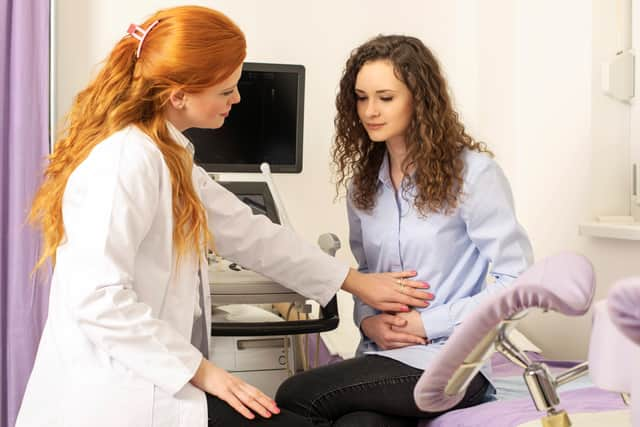Ovarian cancer symptoms: signs and treatment explained as charity calls for urgent action to raise awareness
and live on Freeview channel 276
Target Ovarian Cancer said that only 3% of women are confident in naming all of the symptoms of the disease. But what are the symptoms? Here’s what you need to know.
What are the symptoms of ovarian cancer?
The four main symptoms are:
- a swollen tummy or feeling bloated
- pain or tenderness in your tummy or the area between the hips (pelvis)
- no appetite or feeling full quickly after eating
- an urgent need to pee or needing to pee more often
Other symptoms of ovarian cancer can include:
- indigestion
- constipation or diarrhoea
- back pain
- feeling tired all the time
- losing weight without trying
- bleeding from the vagina after the menopause


What did the poll find?
The charity said just one in five were able to identify bloating as a sign, according to the poll of 1,000 women across the UK. Only 1% were able to identify increased urinary urgency or frequency as a symptom and just 3% knew feeling full or a loss of appetite could be a sign of ovarian cancer.
Advertisement
Hide AdAdvertisement
Hide AdHowever, almost a third (32%) knew that pelvic or abdominal pain was a symptom, but 40% believed that cervical screening detects cases of ovarian cancer – when this screening is only able to check the health of a woman’s cervix.
The charity warned low awareness rates mean that women may not be able to spot when something is awry and may delay seeking help from a GP. The new report also called for more awareness among medics after it found that over a quarter of 447 women with ovarian cancer made three or more visits to their GP before being referred for tests.
The authors said there also needs to be investment in the clinical nurse specialist workforce and better mental health support for patients.
The report authors wrote: “We must urgently go further to raise awareness, with sustained government-funded national awareness campaigns that highlight the symptoms of ovarian cancer in every nation of the UK.”
Advertisement
Hide AdAdvertisement
Hide AdAnnwen Jones, chief executive of Target Ovarian Cancer, added: “Ovarian cancer is not going away. We can change the course of this disease.”
When should I see a GP?
You should see a GP if you have any symptoms of ovarian cancer. These symptoms are very common and can be caused by many different conditions, but it’s still important to get them checked.
At the GP appointment, you will be asked about your health and symptoms. You should Tell the GP if anyone in your family has or had ovarian or breast cancer.
The GP or practice nurse may ask to examine you. You can ask for a female doctor or nurse when you book your appointment.
Advertisement
Hide AdAdvertisement
Hide AdThe GP or practice nurse may refer you for more tests or to see a specialist in hospital if they think you have a condition that needs to be investigated. This may be an urgent referral, usually within two weeks, if you have certain symptoms, but does not definitely mean you have cancer.
How is ovarian cancer treated?
According to the NHS, treatment for ovarian cancer will depend on:
- the size and type of ovarian cancer you have
- where the cancer is
- if it has spread
- your general health
The main treatments are surgery and chemotherapy. Other treatments include targeted medicines and hormone treatments.
The specialist care team looking after you will:
- explain the treatments, benefits and side effects
- work with you to create a treatment plan that is best for you
- talk to you about how treatment may affect you, for instance if there are any side effects
You’ll have regular check-ups during and after any treatments. You may also have tests and scans. If you have any symptoms or side effects that you are worried about, talk to your specialists.
Comment Guidelines
National World encourages reader discussion on our stories. User feedback, insights and back-and-forth exchanges add a rich layer of context to reporting. Please review our Community Guidelines before commenting.
